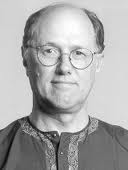IS WAR IN OUR GENES?
by George Wolfe
Each Memorial Day I join America’s Hometown Band under the direction of Roger McConnell to provide music for the remembrance service honoring veterans at Beech Grove cemetery in Muncie, Indiana. After the service, I walk among the many graves of the soldiers who died on the battlefield. I notice that one grave has a Star of David, rather than a cross, etched on its marker. This lone gravestone reminds us that every May memorial service should include at least one interfaith prayer. Americans from all faiths have made the ultimate sacrifice.
I ponder the young lives lost, but also the human potential, intelligence, creativity and inventiveness that never blossomed. Every war has been a disastrous economic and cultural setback for human progress and civilization.
Some evolution theorists have maintained that the reason for war is that violence is in our genes. They insist that because humans evolved from a lower primate, we have inherited aggressive defense and survival mechanisms that enabled us to successfully compete as hunter-gatherers in the pre-civilized world. These aggressive traits still influence human behavior, causing us to have a predisposition for violence and revenge. Referred to as “biological determinism,” this view asserts that war is inevitable, intrinsic to the human condition and like the poor, will always be with us.
According to the United Nations Educational, Scientific and Cultural Organization (UNESCO), studies in the 1980s revealed this notion to be prevalent, with roughly 50 percent of the people surveyed believing that humans are predisposed to war and violence. In response, leading behavioral scientists representing twelve nations produced The Seville Statement on Violence, which was published in 1991. This document refutes the dangerously simplistic generalizations of biological determinism.
While primates, including humans, do possess aggressive traits, they also exhibit cooperative and altruistic behaviors. Many of these altruistic behaviors are believed to have evolved out of the need for mothers to nurture their young. It is a mistake to assume that aggressive traits have been selected through evolution more so than other kinds of behaviors. The scientists concluded “that biology does not condemn humanity to war, and that humanity can be freed from the bondage of biological pessimism.”
On January 13, 1982, an unassuming man demonstrated a level of altruism that defies the popular view that survival is the underlying determinate in human evolution.
Arland Williams was a passenger on Air Florida flight 90. Soon after takeoff, the airliner lost altitude and crashed in Washington DC, hitting the Fourteenth Street bridge before plunging into the icy waters of the Potomac River.
Williams, along with five other passengers to survive the crash, were spotted in the river in desperate need of help. A police helicopter arrived and dropped a rescue line. Arland Williams grabbed the line and handed it to one of the flight attendants. He did this a second time, and perhaps a third time as well. When the helicopter returned a final time, Williams had disappeared under the frigid waters.
The following year, President Reagan honored Williams, posthumously awarding him the United States Coast Guard’s Gold Lifesaving Medal.
The actions of Arland Williams on that bitter January day reveal the altruistic side of human nature, one that is inherently sacrificing, compassionate and responsive to the needs of others. Awakening this selfless human potential, which is one purpose of spiritual practice, is what enables us to overcome our primitive survival defensive mechanisms.
We will find genuine security when we recognize that it is in the interest of all developed nations to build peace through education, economic development, spiritual practice and cultural understanding. Promoting such strategies provide humanity with constructive alternatives to violence, and perhaps one day will relegate war to the dark legacy of an unenlightened past.
George Wolfe is Professor Emeritus and former director of the Ball State University Center for Peace and Conflict Studies. He also chairs the Muncie Interfaith Fellowship, is a trained mediator, and the author of The Spiritual Power of Nonviolence: Interfaith Understanding for a Future Without War.



